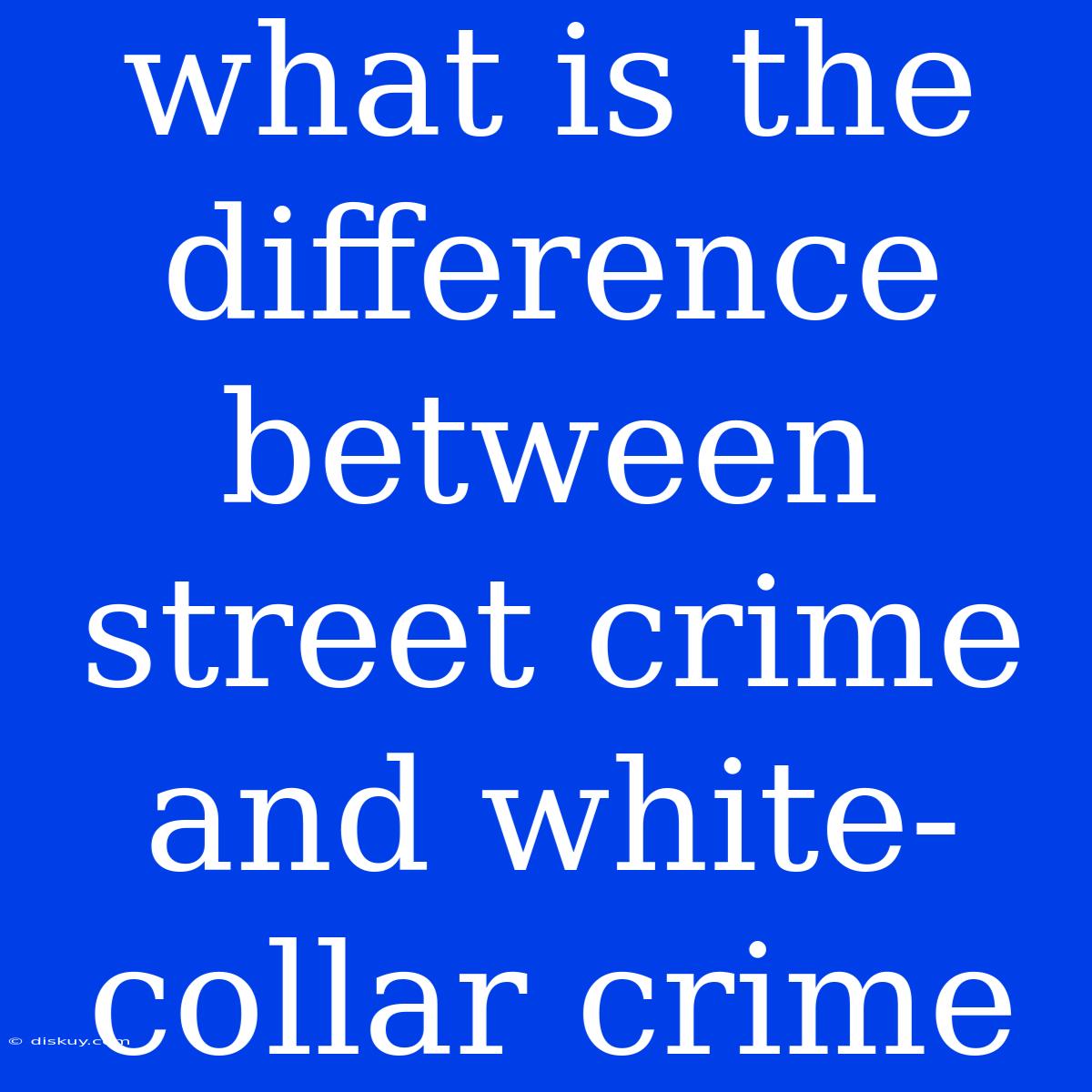What's the Difference Between Street Crime and White-Collar Crime? Unveiling the Nuances of Criminal Behavior
Have you ever wondered what distinguishes the crimes we often see on the news from the ones that make headlines in the financial world? Street crime and white-collar crime are two distinct categories of criminal activity, each with unique characteristics and consequences. Understanding the differences between them is crucial for comprehending the complexities of our legal system and societal impact.
Editor Note: This article examines the contrasting nature of street crime and white-collar crime, exploring their definitions, motivations, and societal impact. Understanding these differences is essential for informed discussions on criminal justice, social equity, and the broader implications of crime on our society.
Why is this important?
The distinction between street crime and white-collar crime is significant because it reveals a disparity in how these offenses are perceived, investigated, and prosecuted. By exploring these differences, we gain a more nuanced understanding of crime's multifaceted nature and its impact on various sectors of society.
Our Analysis:
To understand these distinctions, we delved into legal definitions, examined various case studies, and consulted expert opinions on both street and white-collar crime. This analysis helps us clearly present the characteristics, motives, and societal implications of each category.
Key Takeaways:
| Feature | Street Crime | White-Collar Crime |
|---|---|---|
| Definition | Crimes typically involving violence, theft, or property damage committed in public spaces. | Crimes committed by individuals in positions of power, often for financial gain, through deception or abuse of trust. |
| Motivations | Immediate gratification, survival, lack of opportunity, social influence, substance abuse. | Greed, power, ambition, profit maximization, corporate advantage, social status, manipulation. |
| Methods | Physical force, intimidation, stealth, direct confrontation, illegal trade. | Fraud, embezzlement, money laundering, insider trading, bribery, tax evasion, corporate negligence. |
| Victims | Individuals, businesses, communities, public property. | Individuals, businesses, investors, governments, the economy. |
| Consequences | Incarceration, fines, social stigma, injury or death, community fear. | Fines, imprisonment, reputational damage, financial losses, economic instability, corporate collapse. |
Street Crime
Street crime typically refers to offenses committed in public spaces, often involving direct confrontation or physical harm. These crimes are typically driven by immediate needs, desperation, or a desire for quick gratification.
Key Aspects:
- Violence: Includes assault, robbery, murder, and domestic violence.
- Property Crimes: Covers theft, burglary, vandalism, arson, and auto theft.
- Drug-related Offenses: Involves trafficking, possession, and use of illegal substances.
- Public Disorder: Encompasses offenses like disorderly conduct, public intoxication, and fighting.
White-Collar Crime
White-collar crime, on the other hand, involves offenses committed by individuals in positions of power and trust, often for personal or corporate gain. These crimes are frequently characterized by deception, manipulation, and abuse of authority.
Key Aspects:
- Financial Fraud: Includes schemes like Ponzi schemes, identity theft, and credit card fraud.
- Corporate Crime: Encompasses offenses like price-fixing, environmental violations, and accounting fraud.
- Insider Trading: Exploiting confidential information for personal financial gain.
- Tax Evasion: Deliberately avoiding tax obligations through illegal means.
The Impact of Street Crime vs. White-Collar Crime
The consequences of these two crime categories are far-reaching and affect different aspects of society:
- Street Crime: Leads to fear and insecurity in communities, disrupts public safety, and often affects vulnerable populations. It contributes to social inequality and limited access to resources for marginalized groups.
- White-Collar Crime: Can result in substantial financial losses, damage investor confidence, and erode public trust in institutions. It can also undermine economic stability, disrupt markets, and erode fair competition.
It's essential to acknowledge that both street crime and white-collar crime have significant social and economic implications. Understanding the distinctions between these categories is crucial for developing effective crime prevention strategies and promoting a just and equitable society.
FAQs on Street Crime and White-Collar Crime
Here are some common questions about these two categories of crime:
Q: Why is white-collar crime often seen as less serious than street crime?
A: This perception is often linked to the lack of visible victims, the perceived lack of immediate danger, and the social status of the perpetrators. However, the consequences of white-collar crime can be devastating, both financially and socially.
Q: Are there any overlaps between street crime and white-collar crime?
A: While they are distinct categories, there are instances of overlap, such as organized crime syndicates engaging in both street-level activities and sophisticated financial schemes.
Q: What are some effective strategies for combating white-collar crime?
A: Effective strategies include robust regulation, increased transparency, strengthening enforcement, public awareness campaigns, and promoting ethical corporate practices.
Tips for Understanding Street Crime and White-Collar Crime
- Stay informed: Keep up with news and reports on both categories of crime.
- Be cautious: Practice safe habits to protect yourself from street crime and financial scams.
- Support organizations: Contribute to organizations that advocate for criminal justice reform and community safety.
Summary of Street Crime and White-Collar Crime
By examining the definitions, motivations, and consequences of street crime and white-collar crime, we gain a deeper understanding of the diverse nature of criminal activity. It's important to recognize that both categories have significant social and economic impacts, requiring effective strategies for prevention and response.
Closing Message:
As we navigate the complexities of crime and justice, it's essential to acknowledge the impact of both street and white-collar crime on our communities and the broader world. By promoting fairness, transparency, and accountability across all sectors of society, we can strive for a safer, more just, and equitable future.

